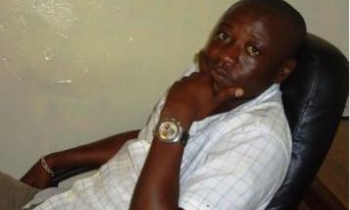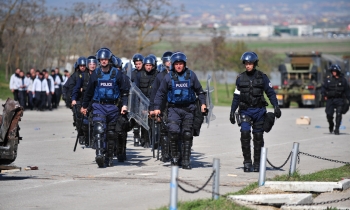Two journalists who covered the volatile North Caucasus have been murdered in Russia in the last 24 hours, the first such killings in nearly a year. The motives are still unclear.
Firefighters found the body of Ilyas Shurpayev, a correspondent for Russian state television’s Channel One, in his Moscow apartment early Friday morning. He had been strangled and stabbed. The perpetrators had apparently set fire to the apartment to cover their tracks, the station reported.
Authorities with the Investigative Committee, an arm of Russia’s Prosecutor-General’s Office, opened a criminal case into Shurpayev’s murder. Authorities have ruled out robbery since Shurpayev’s valuables, including his laptop, were not taken, local press reported.
The New York-based Committee to Protect Journalists (CPJ) called Channel One’s newsroom in Moscow but a representative declined to comment on the case over the phone. Investigators are looking into Shurpayev’s journalism as well as possible private matters as a motive, Channel One reported.
In a separate case, Gadzhi Abashilov, head of the state radio and television company Dagestan, was shot dead Friday at around 8pm local time, in Dagestan’s capital, Makhachkala. Abashilov, 58, was shot and killed in his car by at least one gunman who fled the scene immediately after, according to news agency RIA Novosti.
Russian journalists, particularly those working in the Caucasus, are often the targets of attacks. Russia regularly ranks as one of the most dangerous countries in the world in which to work as a journalist.
“The presidency of Vladimir Putin has been marred by an appalling record of ineffectiveness in bringing to justice the killers of more than a dozen journalists murdered during his administration,” CPJ Executive Director Joel Simon said. “We urge President-elect Dmitry Medvedev to confront this legacy and ensure that those responsible for these two killings are brought to justice.”
"It's difficult to imagine someone working for the First Channel [state-run television] would be killed for their work," said Oleg Panfilov, of the Moscow-based Centre for Journalism in Extreme Situations. "I can't remember any of his material that could have led to this, and I think it's more likely to be about personal reasons."
According to local press reports, Shurpayev, 32, had moved to Moscow in February from his native Dagestan in Russia’s volatile North Caucasus region, where he worked as a local correspondent for Channel One. Prior to joining Channel One, Shurpayev worked for the state-controlled NTV channel. He reported from the North Caucasus for both television companies.
Hours before his death, Shurpayev wrote in his personal blog that the owners of a newspaper in Dagestan—Nastoyashee Vremya—had banned a column he had written and instructed the staff to not mention his name in publications. “Now I am a dissident!” was the blog entry’s title. According to his blog, Shurpayev was shocked by the ban because the column was not political.
According to the independent news website Lenta, Shurpayev called his building’s concierge around 2am, asking for the admittance of two male visitors. Shortly after, Shurpayev’s neighbours called firefighters about smoke coming from the apartment. His body was discovered with stab wounds and a belt around his neck.
His last television report on Channel One earlier this month was about the reconstruction of an Orthodox monastery in Abkhazia, a pro-Russian separatist region of Georgia, RIA Novosti news agency said.
On the other hand, Abashilov’s driver was injured but survived. An ITAR-TASS report said the shooting took place close to a local grocery store and involved an AK-47. Prosecutor-General Yuri Chaika has reportedly assumed personal control of the investigation, signifying that the case has been given priority.
Before becoming head of Dagestan's State Television and Radio Broadcasting Company, he hosted his own TV programme, edited a local newspaper and served as deputy information minister in the republic.









